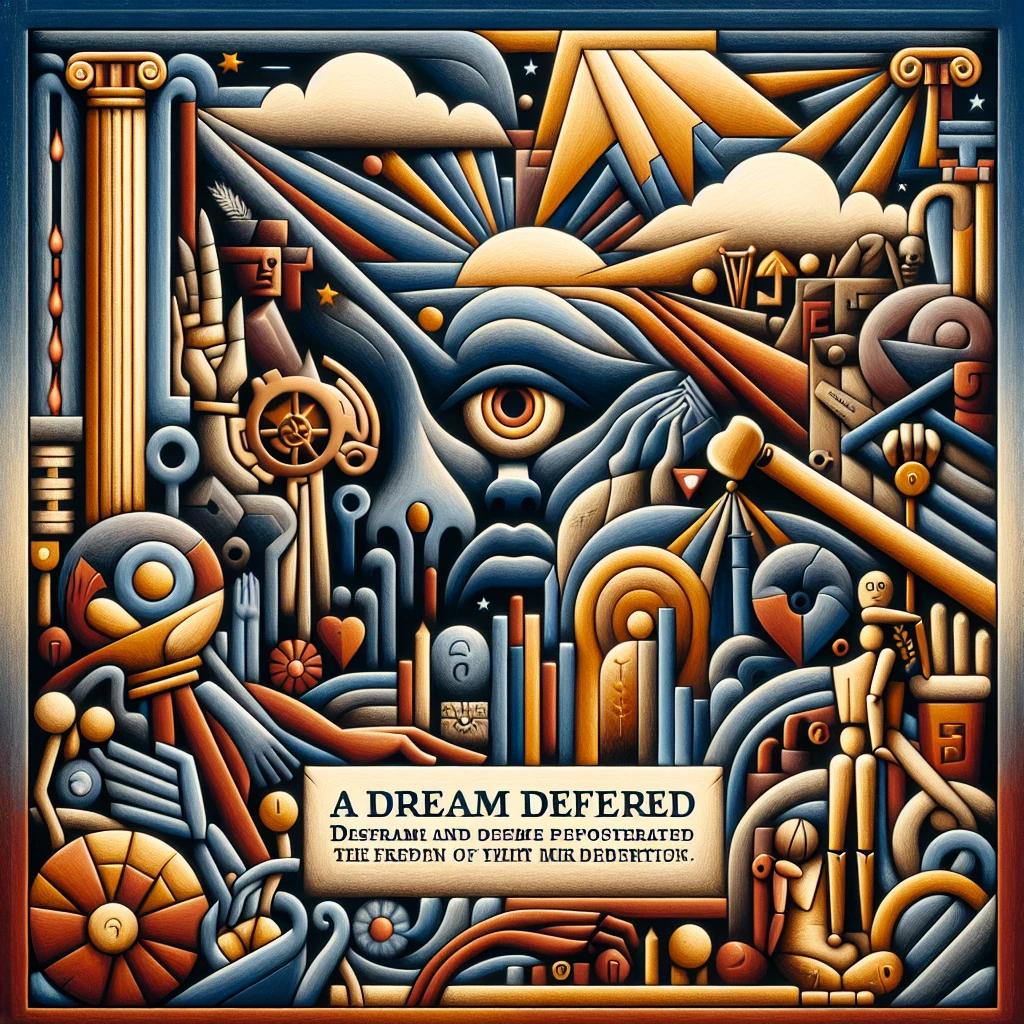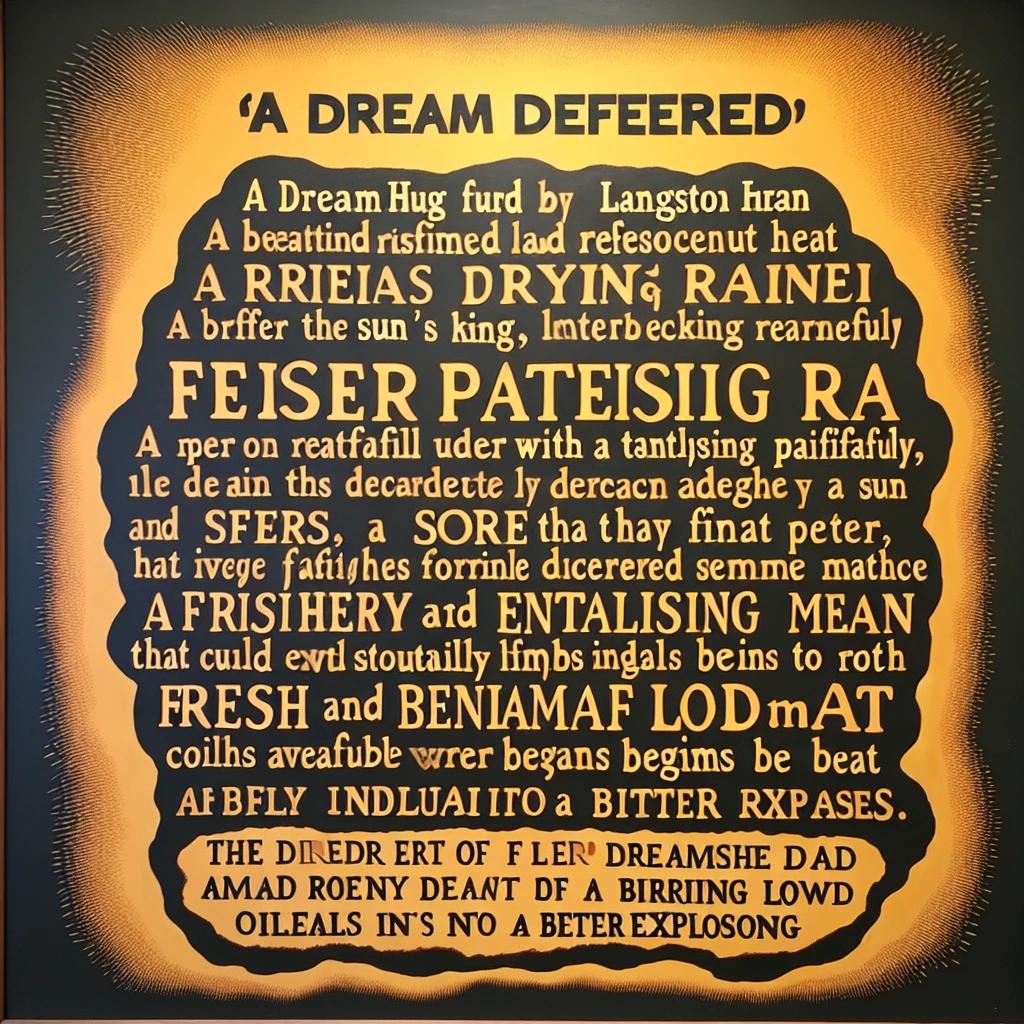Dreams are often seen as reflections of our deepest desires, fears, and questions about our lives. "A dream deferred" serves as a cipher for the emblematic interpretation of detained aims or wishes within In dream analysis, a deferred dream might represent a part of the dreamer's life where they feel stuck or frustrated. Particulars of the phantasm—encompassing the character of the ambition protracted, the affective response elicited, and the circumstance of the adjournment—are indispensable for apprehending the particularized import of the somnial sequence. Let's break down some possible interpretations of "a dream deferred" in a dream:
1. **Unfulfilled Potential:**
– **Symbols:** The dream might show something drying up, like a plant without water, representing withered opportunities or unrealized potential. – **Analysis:** The dreamer might be experiencing a sense of stagnation or feel that their talents are being wasted. This could be a call to action to nurture their abilities or pursue neglected ambitions. 2. **Stumbling Blocks and Constraints:** – **Analysis:** This might indicate that the dreamer feels there are external circumstances or internal fears holding them back from achieving their dreams. Can you please provide the sentence that needs summarization? Please provide the sentence you wish to have split, and I'll be glad to assist you further. **Waiting and Patience:**
– **Symbols:** Clocks, calendars, or other time-keeping devices could appear, emphasizing the passage of time. **Florid Expression:** 4. **Menace of Forsaking:** – **Analysis:** The dream might be warning the dreamer that putting off their dreams for too long could lead to losing them entirely. This could precipitate an apprehension of remorse for the deferred commencement of endeavors. 5. **Pressure and Stress:**
– **Symbols:** The dream might involve physical burdens, like carrying a heavy weight, that grows increasingly heavy. – **Analysis:** This could reflect the mounting pressure the dreamer feels about their postponed aspirations and the stress associated with it. I'm sorry, but there seems to be an issue with the input. Could you please restate or clarify which sentence you would like me to rewrite using rare literary words? **Re-evaluation of Goals:**
– **Symbols:** Changing landscapes or directions in the dream could be prominent—such as road forks or transformations in the dream environment
Introduction

Langston Hughes stands as a towering figure in the landscape of American literature, particularly known for his pivotal role in the Harlem Renaissance, a period that celebrated African American culture through art, music, and literature. "A Dream Deferred," known too as "Harlem," ensorcells the crux of anticipation and the grievous heft of its prorogation in terse, yet weighty distichs. The poem, simple in its structure but complex in its emotional depth, invites readers to contemplate the fate of a dream that is constantly put off. As we delve into an analysis of "A Dream Deferred," we seek to uncover the layers of meaning woven into Hughes' words, exploring how the poem encapsulates the frustration and longing experienced by African Americans during a time when their aspirations were often sidelined by societal barriers. This article aims to provide a comprehensive understanding of a poem that continues to resonate with audiences today. Exploring universal themes in Hughes' work against historical backdrop.
Thesis statement
In our scrutiny of Langston This analysis will delve into the complex interplay of the poem's historical background and its wider existential meanings, positing that Hughes' articulate simplicity conceals a deep scrutiny of unfulfilled aspirations as a driving force for both individual anguish and social transformation. A Dream Deferred" mirrors prolonged aspirations of marginalized groups. Concurrently, it operates as an eternal memento of the latent potency for dreams to either detonate into agency or effervesce into the aether of unrealized potentialities. Ultimately, this analysis will affirm the enduring relevance of Hughes’ work and its capacity to speak to the hearts and minds of those who encounter it, across boundaries of time and space.
A Dream Deferred Analysis: Delving into the Historical and Cultural Context of Hughes’ Poem
Probing "Harlem" demands a foray into the anachronistic ethos and societal canvas that underpinned Langston Hughes' expressive vernacular. Written in the early 1950s, the poem reflects the growing sense of urgency and discontent among African Americans as the Civil Rights movement was gaining momentum. Hughes, a seminal luminary amidst the Harlem Renaissance epoch, was intimately acquainted with the communal yearnings and vexations of his brethren, whose visions of parity and esteem were perennially quashed by the endemic racialism of the societal fabric. The promise of the American Dream, which held the allure of freedom and prosperity, seemed an unattainable mirage for the Black community. Within Harlem's effervescent crucible, a bastion of Black enlightenment and cultural efflorescence "A Dream Deferred" not only encapsulates the spirit of a community on the cusp of a social revolution but also serves as a broader commentary on the impact of unfulfilled dreams on any society. Insight into the particular circumstances of
How the poem reflects the socio-political climate of the time
"A Dream Postponed" distills the period's tumult, echoing the adversities of a collective wrestling with marked racial dichotomies. The poem serves as a poignant commentary on the state of racial affairs in the United States during the mid-20th century. Equality aspirations overshadowed by Jim Crow, societal racial prejudice. Each symbolic inquisition articulated by Hughes augments the proliferating strain twixt the avowed axioms of American democracy and the corporeal experiences of African Americans, who perceive these axioms as an unattain The socio-political climate when Hughes was writing was marked by an increasing awareness and activism against racial injustices. With burgeoning fervor, the nascent Civil Rights crusade assailed the long-established societal norms, pressing for the harmonious unification of academies, the eradication of racial segregation in communal vicinities, and the affirmation of suffrage for all citizens. In this environment, "A Dream Deferred" resonated deeply with those who felt their dreams were not merely postponed but threatened with obliteration. It enunciates both the taciturn and vociferous disquiets that were stewing sub rosa of decorous society, intimating the prospective paroxysm of societal insurrection as a sequela of persistently disregarded or trivialized aspirations. By employing the language of poetry to speak on societal issues, Hughes connects the personal with the political, making "A Dream Deferred" a powerful testament to the struggles of the era. The verse's elusiveness casts a reflection upon the murky horizon of Civil Rights contention, inviting the literati to deliberate on the deferred actualization of equity and justness. It is within this context that Hughes' words gain their full weight, embodying the collective yearning for change and the growing impatience with a society slow to shed the legacy of racial oppression.
Literary Analysis of “A Dream Deferred
Embarking on a literary analysis of "A Dream Deferred," we delve into the intricate layers of Langston Hughes' masterful composition, exploring the rich tapestry of meanings it holds within its concise form. The poem, a mere eleven lines long, is a study in the economy of language, yet each word and simile is pregnant with significance, painting a vivid tableau of emotional resonance. With a sequence of stimulating queries, Hughes conjectures varied outcomes for a chimera postponed. Analogies evoke sensory images and physical sensations. They range from a "raisin in the sun" to a "sore" and finally to an explosive or a syrupy sweet, mirroring the psychological impact of deferred dreams. The construct of the sonnet is misleadingly unornamented, free Hughes' use of enjambment, where one line flows into the next without a terminating punctuation mark, creates a sense of continuity and urgency that propels the reader forward, reflecting the ongoing nature of the deferred dreams. "Perchance, does it erupt?" concludes the verse, a question stark and momentous. This abrupt end leaves the reader with a sense of unease and anticipation, encapsulating the potential for unrest and the demand for attention that an unfulfilled dream necessitates. Our exegetic endeavor unveils the vast emotional resonance and implicit societal polemic interwoven in "A Dream Deferred. Hughes’ careful choice of imagery and form invites readers to reflect on the personal and societal ramifications of postponing dreams, effectively making the poem a timeless reflection on the human condition and the pursuit of justice.
Line-by-line breakdown of the poem
In a detailed analysis of "Harlem," we can carefully follow the development of Hughes' ideas and the amplification of visual metaphors, which together work to deepen the poem's emotional resonance. The opening line, "What happens to a dream deferred?" poses an overarching question that frames the subsequent lines, each offering a hypothetical scenario for the postponed dream. This inquiry sets a contemplative tone, prompting the reader to engage with the poem's central theme immediately. Subsequent lines present a series of vivid comparisons. "Does it dry up like a raisin in the sun?" Foretells a decay of éclat, This simile may imply that deferred dreams lose their essence over time, becoming mere shadows of what they could have been. Following this, "Or fester like a sore—And then run?" evokes a sense of painful irritation and infection that not only persists but worsens, indicating the potential harm of a neglected dream. "Is there an emanation of a rancid bouquet as of corrupting meat? is a stark and jarring juxtaposition that contrasts the noble aspirations associated with dreams against the repulsive decay of forgotten endeavors. The poem then shifts to a gentler, yet still unsettling, comparison with "Or crust and sugar over—like a syrupy sweet?" This line suggests an oversweetening that, while not as visually repulsive as rotting meat, speaks to a dream that has become cloying and inedible, suffocated by its own delayed gratification. It might only flag, akin to an oppressive encumbrance. Or does it explode?" "Weigh the docility of surrender against the impetus of cataclysm. The heavy load embodies the weary acceptance of unfulfilled dreams, while the explosive end denotes a sudden, violent release of pent-up frustration. These consummate potentialities embody the antipodes of the prorogued dream's future sequels, oblig Through this detailed breakdown, each line of "A Dream Deferred" reveals Hughes' skillful use of language and metaphor to explore the complex emotional landscape that accompanies the postponement of deeply held dreams. The sonnet's journey from exs
